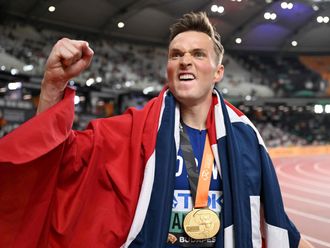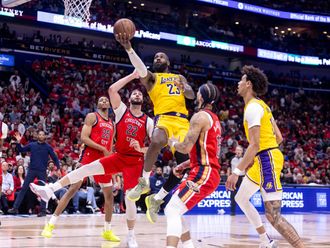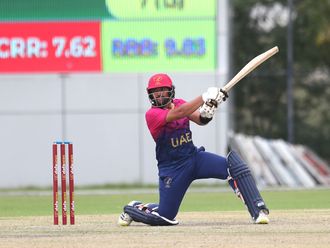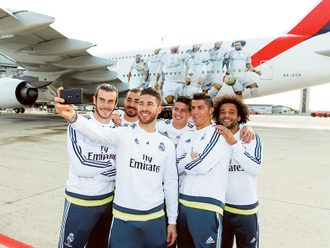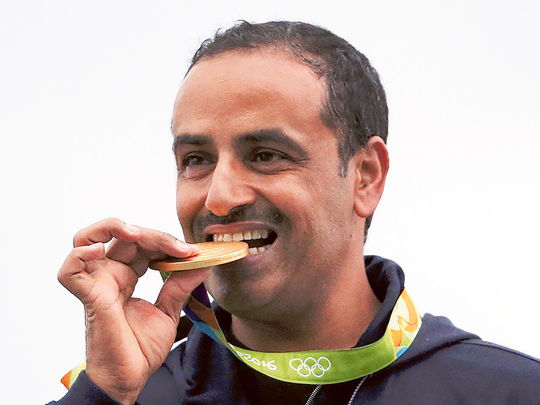
RIO DE JANEIRO The remnants of the final two targets scattered in the dreary Brazilian sky, landing in dozens of places across the rain-soaked Olympic shooting range.
Fehaid Al-Deehani raised his shotgun overhead with a shout and turned toward the crowd, pounding his chest as he walked toward them.
No matter what his team was called, what flag was raised or anthem played, the gold medal belonged to him.
Competing as an independent athlete with Kuwait’s Olympic committee suspended, Al-Deehani captured the first gold medal of his storied career by beating Italy’s Marco Innocenti in the men’s double trap finals Wednesday at the Rio de Janeiro Games.
“That was for my country, for the people who don’t want us to participate in the Olympics,” Al-Deehani said. “I’m showing them that we are here and we got the medal.”
A proud Kuwaiti army officer, Al-Deehani is not just the most decorated Olympic athlete in his country, he is the only one to earn a medal. He won his first, a bronze, at the 2000 Sydney Games and another in London four years ago.
Rio was his sixth Olympics, but it would not be for Kuwait.
The Arab country has been engaged in an ongoing rift with the IOC, which has accused Kuwait’s government of interfering with sports.
The IOC suspended Kuwait in October and the country countered will a $1.3 billion lawsuit against 14 board members of the Gulf state’s Olympic committee and the national federations of several sports. A lawsuit against the IOC was thrown out by a Swiss court.
The IOC made a concession just before the Rio Olympics, allowing Kuwait’s athletes to participate as independents under the IOC flag, should they qualify.
Al-Deehani refused to carry the IOC flag for the independent team during opening ceremony, saying he would only carry Kuwait’s flag.
Once shooting started in Rio, Al-Deehani became intent on defying the IOC’s decision by winning a medal for his country, not an independent team filled with Kuwaitis.
Al-Deehani almost didn’t make it past the semi-finals, needing a shoot-off to get past American Joshua Richmond into the final six.
But Al-Deehani had the best score in the semi-finals, hitting 28 targets to earn a spot against Innocenti in the gold-medal match. With at least silver in his grasp, Al-Deehani dropped to his knees and put his face to the ground before getting up and pounding his chest at the crowd.
“The feeling was much better than any before because you know if you are competing for the gold medal, you have at least the silver for sure,” Al-Deehani said.
He didn’t want to stop there, though.
His confidence soaring, Al-Deehani took an early lead in the final and overcame a couple of late missed shots to put himself in position for gold. Shooting first and leading by two, he knew gold was his if he hit both targets on his final turn.
Al-Deehani’s shots were true and so was his heart as he pounded it numerous times at the crowd.
But sorrow tinged the joy once he stepped on the top step of the podium.
Wearing a plain blue sweatshirt, Al-Deehani raised his arms and smiled before receiving the gold medal, but turned somber as the IOC anthem played and the IOC flag was raised instead of his country’s.
“It hurts very much,” said Al-Deehani, who struggled to stifle tears as the IOC anthem played. “I can’t describe my pain. It is too sad.”
Steven Scott hit all 30 targets to defeat British shooter Tim Kneale for the bronze medal


